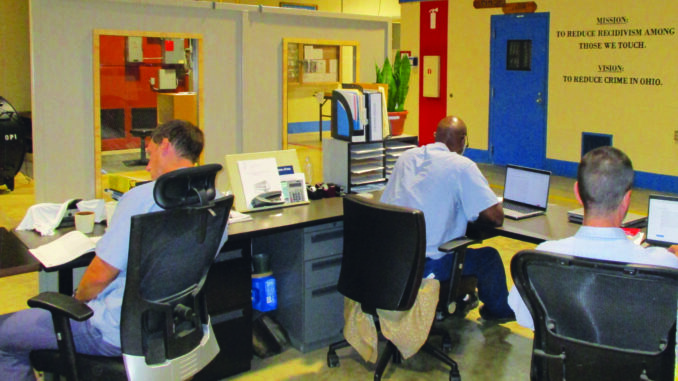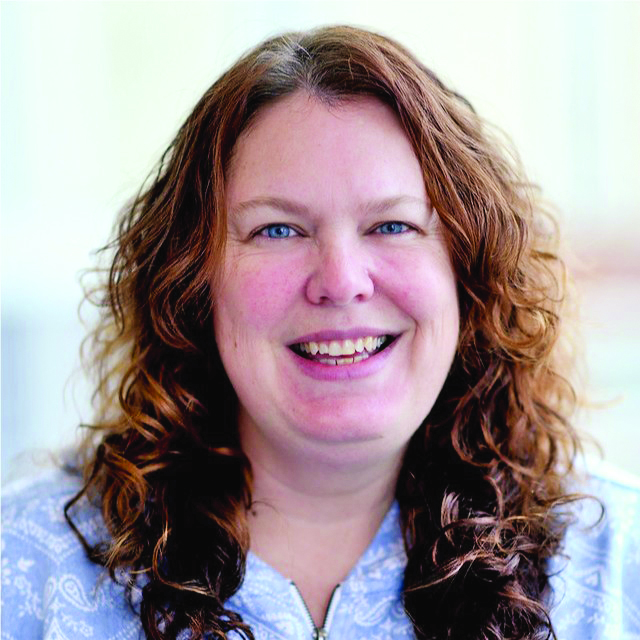
Ohio’s Guide to Colleges & Universities: University of Akron offers incarcerated population hope
By Terry Troy
For those who participate and complete the program, it could be the next step toward gainful employment, self-reliance and re-assimilating in our state’s society. For participating companies, it helps fulfill a very real workplace need.
Through a new initiative from The University of Akron (UA), Ohio’s prison system is offering incarcerated individuals an opportunity to receive an associate degree, which could lead to an employment opportunity once they have served their time. The result of a collaborative effort among UA, Ohio Penal Industries (OPI) at Madison Correctional Facility, Summit Glove of Minerva and American Nitrile of Grove City, the program extends an opportunity for employment at American Nitrile upon release, making medical, non-medical and industrial nitrile gloves.
OPI and Summit Glove have partnered with the College of Engineering and Polymer Science at UA to provide online training for inmates. The courses are taught like traditional online courses, providing a back and forth between the professors and students, despite incarceration. Participating students can earn an Associate of Applied Science in Polymer Technology.
“UA is happy to embrace this opportunity to contribute to the intellectual growth of incarcerated adults while they are serving their time,” says Sadhan Jana, professor in the College of Engineering and Polymer Science. “We are glad that they can get a degree and go take up a job in the polymer industries where there is shortage of such skills.”
“It is important to know that with our workforce we cannot have people in class all day,” adds Ann King, chief of industries at OPI, who adds that the classes are not easy and incarcerated students must work hard to graduate. “So, we have created a cycle, so that everyone will get the opportunity to take these classes. We currently have 45 interested. So as one class goes through, another group will be able to go in.”
OPI employs roughly 1,200 incarcerated adults in 27 different operations around the state. OPI is a program through the Ohio Department of Rehabilitation and Correction. The OPI program seeks to reduce recidivism by enabling incarcerated adults to acquire real life skills and experience that makes them better prepared to maintain employment after they are released.
“Training and education are a big part of what we do every day for our incarcerated workers,” says King. “Studies show that education, training and certifications are what helps reduce recidivism. So that’s what we are trying to do and what Ohio Penal Industries is all about.”
The current cohort at the correctional facility is 24 students, each working toward an associate degree offered in collaboration between the UA College of Engineering and Polymer Science (CEPS) and the Buchtel College of Arts and Sciences (BCAS). Along with the coursework from technical areas such as polymer manufacturing, the degree also includes general education, which can be transferable if the student eventually decides to pursue a bachelor’s degree.
First classes began this summer with Introduction to Public Speaking taught in BCAS.
“It was absolutely one of the best teaching experiences I’ve ever had,” says Mary Triece, one of the two faculty members who helped launch the program in the BCAS School of Communication. “The students were hard working, dedicated and truly cared about learning. They were smart and thoughtful with their work. I was delighted to get to meet with them live on Teams to communicate with them and hear their speeches. They shared a good deal of their experiences, which just reinforced my belief in de-incarceration, particularly for nonviolent offenses. These students have so much to contribute their communities.
“I am deeply dedicated to teaching people in correctional facilities, and I hope to be able to help expand this program so that we can reach more students.”
“I really enjoyed getting to know them throughout the semester and listening to their speeches,” adds Amber Ferris, the other professor who helped launch the program. “You can learn a lot about a student based on the topics they choose to speak about. It was really important to be supportive in that first speech to ease their fears and to let them know we were there for them. I feel like after that speech, we had a good rapport going and that helped the class be successful.”
Ferris and Triece are working hand in hand with Patrick Tabatcher in Online Learning Services and Wendy Lampner, UA’s director of Online, Continuing and Professional Education.

“Amber and Mary were discovering and resolving issues well past the 11th hour,” says Lampner. “They gracefully embraced numerous last-minute changes to the course start date and adjusting their syllabus multiple times to accommodate evolving needs. Amber and Mary demonstrated unwavering availability and were always willing to engage in discussions and collaborate on solutions to ensure the success of the program.
“The feedback we’ve received from the prison has been overwhelmingly positive. The students enjoyed the class and felt supported in their learning.”
What class are the students enrolled in today? This fall, it was a BCAS course in Pan-Africa Studies and Diversity in American Society. The Spring 2024 semester will see students take Human Relations in the School of Social Work and Family Sciences in the College of Health and Human Services.
Not too surprisingly, the “incarceration to employment” program, like its students, was born of adversity.
During the pandemic, the heightened demand for personal protective equipment (PPE) resulted in a critical shortage across various institutions. Recognizing this pressing issue, OPI took notice and found themselves with a group of inmates eager to expand their skillset. OPI traditionally had incarcerated workers engaged in in-house production tasks, such as manufacturing license plates and trash bags, but the urgent need for additional PPE became evident.
Extensive research led OPI to conclude that they could not undertake this endeavor without the necessary training and expertise. In response to this challenge, OPI initiated a collaboration with Summit Gloves, a decision that paved the way for a transformative project: the production of latex gloves. The intricate process involved dipping ceramic hand forms into liquid latex or alternative rubber materials, like nitrile, to meet the critical demand for protective gear.
Now, Summit Glove is working with OPI to build a glove factory at the Madison Correctional Institution in London, Ohio. They have plans to be in production by spring 2024.
American Nitrile is also building a 530,000-square-foot manufacturing plant in Grove City and is hoping to accommodate the incarcerated adults upon their release. Jobs there will pay at least $60,000 per year.
